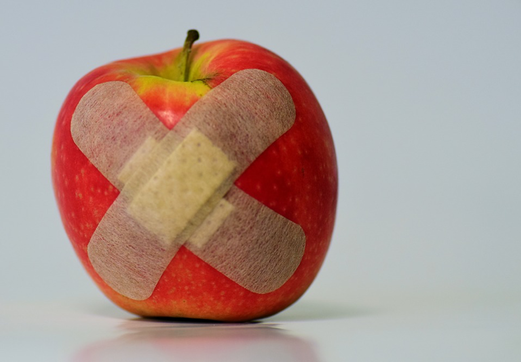|
Injuries are an unfortunate and sometimes unavoidable aspect of participation in sport and exercise. Treatment options for injury often include rest, ice massage, manual therapy, heat, electrical stimulation and acupuncture. An often overlooked intervention is nutrition. To understand the potential of food to help in the healing process, we first need to understand a little bit about the stages of injury. Most exercise-related injuries go through three main stages in the recovery process. In the first stage, which lasts anywhere from 1-7 days, pain, swelling, redness and heat draws chemicals to the injured area to start the healing process and increase blood flow to the area. In the second stage which can start as early as day 4 and last about 6 weeks, inflammation begins to settle down and the body starts to repair the damaged tissue by laying down collagen. These new collagen fibres are put down in a in the form of scar tissue, which is weaker and less flexible than normal tissues. In the third stage which starts around 2-3 weeks post injury, healing continues to progress and the collagen fibres improve in quality, organization and strength. Nutrition plays an important role in each of these stages.  Stage 1 Although inflammation is a critical part of triggering the repair process, too much may cause more damage. During this phase, try to include more anti-inflammatory fats in your diet. These include:
At the same time, try to limit pro-inflammatory foods like:
Stage 2 and 3 In these stages, metabolism may increase anywhere from 15-50% to support new tissue growth. So you'll need more calories than when you are sedentary, but fewer than when you are training and exercising regularly. Over the course of the day:
Unlock Foods Potential to Heal Next time you find yourself sidelined with an injury, consider adding a registered dietitian to your treatment team to help ensure that you are getting the right nutrients to support your body in healing. Writer: Stephanie MacNeill (RD)
24 Comments
27/7/2018 02:26:38 am
Thank you for featuring here the foods that have nutritional benefits and could help the healing process of an injury. Through this, we would also know the foods that we need to avoid in order to let the process be faster. We all have different tolerance of pain, and knowing the basic treatments will make it more bearable for us. It is great that there are a lot of alternative remedies, because some are not accessible enough for other people. Treatments should be done accordingly in order to prevent the injury to be worse than it is.
Reply
11/7/2019 07:59:45 pm
To make a balance of nutrition level in our body is very important when we get in sports and I read that article at a writing website and I found that article very useful. So I shared that with my friends also.
Reply
22/6/2021 01:33:40 pm
Therefore, Tencent mobile has launched PUBG Lite. It is nothing but the light version of the game which can run on devices having a slightly.
Reply
29/6/2021 01:50:27 pm
Colorado Architectural Drafting Services has vast experience in every aspect of CAD operations offering unparalleled standards of value, flexibility and service.
Reply
30/6/2021 01:34:14 pm
Precision and accuracy underline our CAD drafting services, ably backed by an expert team that extensively understands design, architecture and prototyping.
Reply
1/7/2021 04:42:36 pm
Our goal is to help you achieve your goals without breaking your budget. We are here to help your company rebuild after the economic downturn that has affected everyone. Our company has emerged as a partner of choice for building design, construction and industrial design engineering outsourcing, and has worked with more than 5000 clients. With our highly experienced CAD Managers and rigid in-house Quality Procedures we can manage the complete CAD process for your projects from start to finish.
Reply
Reply
3/7/2021 02:45:24 pm
At Maryland Architectural Drafting and Design Services, our goal is to transform Your Vision into a timeless design and create a comprehensive set of architectural plans that become detailed construction documents which will make your dream home, shop, office or business property a reality.
Reply
4/7/2021 04:39:09 pm
At Pennsylvania Architectural Drafting and Design Services, our goal is to transform Your Vision into a timeless design and create a comprehensive set of architectural plans that become detailed construction documents which will make your dream home, shop, office or business property a reality.
Reply
5/7/2021 05:24:13 pm
At California Architectural Drafting and Design Services, our goal is to transform Your Vision into a timeless design and create a comprehensive set of architectural plans that become detailed construction documents which will make your dream home, shop, office or business property a reality.
Reply
6/7/2021 02:34:53 pm
We offer a full range of architectural design and drafting services from conceptual drawings to help jump start your project all the way through to complete construction plan sets that will set your project in motion. Although our company is not a registered architect or engineering firm, we do have working relationships with architects and various engineering firms and can provide stamped and sealed drawings when required.
Reply
7/7/2021 09:01:08 am
We offer a full range of architectural design and drafting services from conceptual drawings to help jump start your project all the way through to complete construction plan sets that will set your project in motion. Although our company is not a registered architect or engineering firm, we do have working relationships with architects and various engineering firms and can provide stamped and sealed drawings when required.
Reply
We offer a full range of architectural design and drafting services from conceptual drawings to help jump start your project all the way through to complete construction plan sets that will set your project in motion. Although our company is not a registered architect or engineering firm, we do have working relationships with architects and various engineering firms and can provide stamped and sealed drawings when required.
Reply
8/8/2021 10:36:27 am
Guppies are tropical and study fish That is why they can adapt to various habitats.
Reply
11/8/2021 06:51:41 am
Reviews, buying guides, useful information, and everything you need to know about having a personal sauna experience at home.
Reply
17/8/2021 12:34:30 pm
Healthcare is one of the most prominent needs of people globally. There are various patient care and treatments available today, two of which are physical therapy and nursing. Therapies and nursing have become widely known cures for both prolonged and temporary illnesses. They treat a patient irrespective of age. From children to old age adults, they have embraced the knowledge of medicine and incorporated it with natural ways.
Reply
6/9/2021 11:40:32 am
Bulk SMS is evolving as a new business for large and small scale enterprises, educational institutions by providing cost-effective strategies. Sending Bulk SMS
Reply
13/9/2021 10:09:11 am
Are you looking for pressure washer to clean your car, furniture, patio, windows, etc then check out website on pressure washer 2021 UK.
Reply
9/10/2021 04:44:58 pm
Reply
11/10/2021 03:57:50 pm
Welcome to Daily Kayaking, here you will get all bout best Kayak review, guide and best choice advice to buy.
Reply
14/10/2021 07:31:56 am
Hoe een Diamond Painting inlijsten? – Stap voor stap handleiding
Reply
Leave a Reply. |
Categories
All
Archives
November 2021
|
- Home/ News
- About
- Services/ Store
- Media
-
Learning Center
- ESN Athletic and Healthy Lifestyle Learning Center >
-
Professional Learning Center
>
-
The ESN Sports Nutrition Certificate
>
- ESN Learning Center - Sports Nutrition Certificate Level 1 >
- ESN Learning Center Sports Nutrition Certificate Level 2 >
-
ESN Learning Center - Sports Nutrition Certificate Level 3
>
- Module 1 - Periodization for the Athlete
- Module 2 - Nutrition Strategies to Optimize Recovery
- Module 3 - Sports Nutrition for Children and Young Athletes
- Module 4 - Sports Nutrition for the Aging Athlete
- Module 5 - Nutritional Strategies for Injury Prevention and Concussions
- Module 6 - Nutritional Strategies for the Travelling Athlete
- Module 7 - Tournament Nutrition Strategies
-
The ESN Sports Nutrition Certificate
>
- Contact
Proudly powered by Weebly


 RSS Feed
RSS Feed